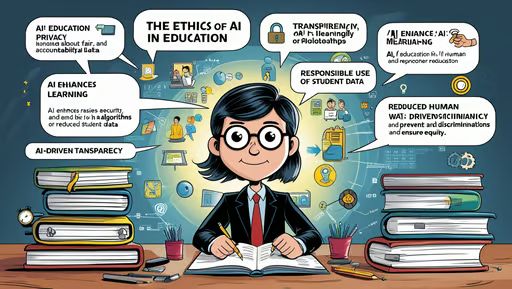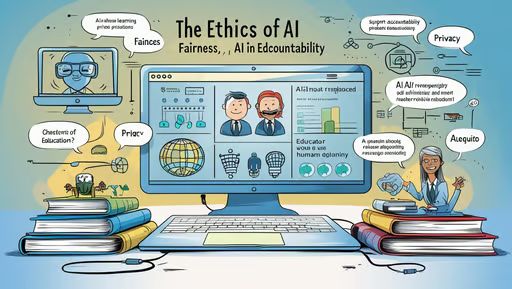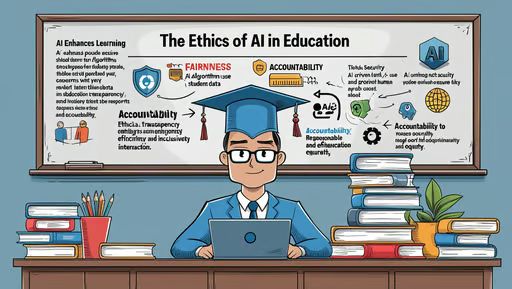Abstract
The Ethics of Artificial Intelligence (AI) in Education, Artificial Intelligence (AI) is rapidly transforming the educational landscape, offering innovative solutions to enhance teaching, learning, and administrative processes. However, the integration of AI in education raises significant ethical concerns that must be addressed to ensure equitable, transparent, and responsible use. This article explores the ethical implications of AI in education, focusing on issues such as data privacy, algorithmic bias, equity, accountability, and the impact on human agency. By examining these challenges, the article argues for the development of robust ethical frameworks and policies to guide the responsible implementation of AI in educational settings.
Introduction
The integration of Artificial Intelligence (AI) in education has the potential to revolutionize how students learn and how educators teach. From personalized learning platforms to automated grading systems, AI technologies promise to enhance efficiency, accessibility, and engagement in educational environments. However, as with any transformative technology, the use of AI in education raises profound ethical questions. These concerns range from the protection of student data to the potential reinforcement of societal biases and the erosion of human agency in learning processes. This article examines the ethical dimensions of AI in education, highlighting key challenges and proposing strategies to ensure that AI technologies are used responsibly and equitably.
1. Data Privacy and Security
One of the most pressing ethical concerns surrounding AI in education is the collection, storage, and use of student data. AI systems rely on vast amounts of data to function effectively, including sensitive information such as academic performance, behavioral patterns, and even biometric data. While this data can be used to personalize learning experiences, it also poses significant risks to student privacy.
The misuse or unauthorized access to student data can lead to breaches of confidentiality, identity theft, and other forms of harm. For example, in 2017, the U.S. Federal Trade Commission fined Google $170 million for illegally collecting children’s data through its educational products (FTC, 2019). Such incidents underscore the need for stringent data protection measures and transparent data governance policies in educational AI systems.
To address these concerns, educational institutions and AI developers must prioritize data privacy by implementing robust encryption methods, anonymizing data, and obtaining informed consent from students and parents. Additionally, policymakers should establish clear regulations, such as the General Data Protection Regulation (GDPR) in the European Union, to safeguard student data and hold organizations accountable for violations.

2. Algorithmic Bias and Fairness
Another critical ethical issue in AI-driven education is the potential for algorithmic bias. AI systems are only as unbiased as the data they are trained on, and if the training data reflects existing societal prejudices, the algorithms may perpetuate or even exacerbate these biases. For instance, an AI-powered grading system trained on historical data may disadvantage students from marginalized backgrounds if the data reflects systemic inequalities.
Research has shown that biased algorithms can lead to unfair outcomes in educational settings. A study by O’Neil (2016) highlights how predictive analytics in education can reinforce stereotypes and limit opportunities for certain groups of students. For example, an AI system might disproportionately flag students from low-income families as “at-risk,” leading to lower expectations and reduced support.
To mitigate algorithmic bias, developers must ensure that AI systems are trained on diverse and representative datasets. Additionally, regular audits and transparency in algorithmic decision-making processes are essential to identify and address biases. Educators and policymakers must also be vigilant in monitoring the impact of AI systems on different student populations to ensure fairness and equity.
3. Equity and Access
While AI has the potential to democratize education by providing personalized learning experiences to students regardless of their location or socioeconomic status, it also risks exacerbating existing inequalities. Access to AI-driven educational tools often requires reliable internet connectivity, advanced devices, and digital literacy, which may not be available to all students.
The digital divide is a significant barrier to the equitable implementation of AI in education. According to a report by UNESCO (2021), nearly half of the world’s students lack access to the internet at home, limiting their ability to benefit from AI-powered educational resources. This disparity is particularly pronounced in low-income and rural communities, where infrastructure and resources are often lacking.
To promote equity, governments and educational institutions must invest in infrastructure and provide affordable access to technology for underserved populations. Additionally, AI developers should design inclusive systems that accommodate diverse learning needs and contexts. For example, AI-powered platforms could offer offline functionality or support multiple languages to reach a broader audience.

4. Accountability and Transparency
The use of AI in education also raises questions about accountability and transparency. When AI systems make decisions that affect students’ academic trajectories, such as recommending courses or predicting performance, it is crucial to understand how these decisions are made. However, many AI algorithms operate as “black boxes,” meaning their decision-making processes are not easily interpretable by humans.This lack of transparency can undermine trust in AI systems and make it difficult to hold developers and institutions accountable for errors or biases. For example, if an AI system incorrectly identifies a student as needing remedial support, the student may suffer long-term consequences without a clear mechanism for appeal or redress.
To address this issue, developers must prioritize explainability in AI systems, ensuring that their decisions can be understood and scrutinized by educators, students, and parents. Policymakers should also establish guidelines for accountability, requiring institutions to document and justify the use of AI in decision-making processes.
5. Impact on Human Agency and Autonomy
A fundamental ethical concern in the use of AI in education is its impact on human agency and autonomy. While AI can provide valuable support and guidance, there is a risk that over-reliance on technology may diminish the role of educators and undermine students’ ability to think critically and independently.
For example, AI-powered tutoring systems may offer immediate feedback and personalized recommendations, but they may also discourage students from developing problem-solving skills and resilience. Similarly, the use of AI for administrative tasks, such as grading and attendance tracking, may reduce the opportunities for meaningful human interaction between teachers and students.
To preserve human agency, AI should be used as a tool to augment, rather than replace, the role of educators. Teachers must remain central to the learning process, using AI to enhance their pedagogical practices and provide individualized support. Additionally, students should be encouraged to engage critically with AI systems, understanding their limitations and developing the skills to navigate an increasingly digital world.
6. Ethical Frameworks and Policy Recommendations
To address the ethical challenges of AI in education, it is essential to develop comprehensive frameworks and policies that prioritize fairness, transparency, and accountability. These frameworks should be informed by interdisciplinary collaboration, involving educators, technologists, ethicists, and policymakers.
Key recommendations include:
- Establishing clear guidelines for data collection, storage, and use, with a focus on protecting student privacy.
- Promoting diversity and inclusivity in AI development to mitigate algorithmic bias.
- Investing in infrastructure and resources to ensure equitable access to AI-driven educational tools.
- Encouraging transparency and explainability in AI systems to build trust and accountability.
- Emphasizing the importance of human agency and critical thinking in the integration of AI in education.
Conclusion
The integration of AI in education offers immense potential to enhance learning experiences and improve educational outcomes. However, it also presents significant ethical challenges that must be addressed to ensure that AI technologies are used responsibly and equitably. By prioritizing data privacy, fairness, transparency, and human agency, stakeholders can harness the benefits of AI while minimizing its risks. As AI continues to evolve, ongoing dialogue and collaboration will be essential to navigate the complex ethical landscape of AI in education.
References
- Federal Trade Commission (FTC). (2019). Google and YouTube Will Pay Record $170 Million for Alleged Violations of Children’s Privacy Law. Retrieved from https://www.ftc.gov
- O’Neil, C. (2016). Weapons of Math Destruction: How Big Data Increases Inequality and Threatens Democracy. Crown Publishing Group.
- UNESCO. (2021). AI and Education: Guidance for Policy-Makers. Retrieved from https://unesdoc.unesco.org
- General Data Protection Regulation (GDPR). (2018). Regulation (EU) 2016/679. Retrieved from https://gdpr-info.eu

13 thoughts on “The Ethics of Artificial Intelligence (AI) in Education”
Comments are closed.